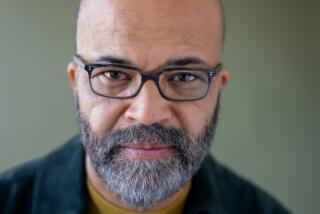PERSPECTIVE ON VIOLENCE : It’s in the Numbers, Not the Stars : Will Wright did everything to beat the odds on black male mortality, but in the end, the gun culture won.
- Share via
Sometimes, it’s like a jungle out there
It makes me wonder
How I keep from going under . . .
-- Grandmaster Flash and the Furious Five
According to Sylvester Monroe, author of the essay “Vital Signs: the Black Male” in the book, “Songs of My People,” the numbers are grim: If you’re a black male between the age of 15 and 25, you are 10 times more likely to be murdered than your white counterpart. In California, you’re three times more likely to be murdered than to enter the University of California. Your cause of death, the numbers say, will more than likely be another young black man. You will also, the numbers opine, be more likely to enter prison than college. Of the twentysomething African-American male population, nearly one in four is or has been incarcerated. Numbers.
Wilfred Wright III was on his way to defying the numbers. Handsome, bright and friendly, Will was also a good athlete. An honors student, he was college-bound, to the University of LaVerne. Voted most talented, most athletic and best buddies by his classmates at Dorsey High, Will had everything to live for. So his friends, family and classmates were stunned when he became a statistic.
Last Tuesday, Wilfred Wright III became another number: death by gunfire. A devastatingly common occurrence, according to the numbers. Death again, at the hand of a young black man. Except the hand of the young black man who shot Will belonged to his own body, a distinct statistical twist. Police have ruled Will’s death “accidental,” the result of a fatal flirtation with Russian roulette. “A misadventure,” a police spokesman mourned.
But maybe it wasn’t. Will was a bright kid, everyone said so. And, given the numbers, which are published with relentless frequency in the media, he had to have been aware of the odds.
Fortunately, he had help. Unlike a lot of the young men who become statistical fatalities, Will had two parents who were actively involved in his life, providing guidance, protection and companionship. His relationship with them was good enough that his parents accompanied him to the baseball games at which he excelled.
But those advantages might also have functioned to his detriment. Wilfred Wright was carrying a gun because, he told Dorsey classmates, he had been harassed by gang members and he needed to protect himself. Dorsey students interviewed by The Times concede that a gun isn’t so outlandish an idea. “If I could get my hands on a gun, I’d have one, too,” a senior told reporters Sandy Banks and Charisse Jones. In his neighborhood, the boy explained, “every time I go home, people chase me and beat me up. You need it to be safe.”
He’s not alone. According to statistics released by the Los Angeles Unified School District, guns are not a rarity in our schools: 134 were confiscated between 1987 and 1991--and that was in our elementary schools! Numbers for high schools are almost 10 times as great. And those are only the ones that were seized.
Those numbers say that students are going to school afraid for their physical well-being. Guns, when some kids can get them, are perhaps seen as a way to negotiate what have become academic killing fields. As they proliferate, one wonders how parents are going to handle schools bristling with guns and other armaments. Can you see Mommy now, checking off the daily necessities as her child heads out the door for school?
“OK, you’ve got your lunch, milk money, your book bag--and oh, Sweetie, don’t forget to check the chamber of your .38. I had to show up at school last week because you forgot your bullets!”
I hope it won’t get to that--it had better not. But Gail Wyatt, a professor of medical psychology in UCLA’s Department of Psychiatry, is not surprised that African-American kids, especially males, worry about their physical futures.
Identification is really important at that age, Wyatt says, and for urban male adolescents, the choices are slim. “You’re a gang member, or . . . what? Often, it’s really not very safe to be a non-gang member.” Kids who are determined to succeed, Wyatt says, are often treated with hostility by those who feel they have been relegated to society’s scrap heap. “The good students are often hassled,” Wyatt explains, “they’re accused of ‘acting white.’ ” Sadly, the taunters have bought into the notion that excellence comes only in one color.
Beneath the taunts, though, may lie an anxiety that most of us can’t, or don’t want to, see. “We really expect a lot of young black males,” Wyatt says. Most of us “have no idea the pressure they’re under.” The normal adolescent hormonal stew, mixed with anxiety about social acceptance and, yes, survival, can depress a person. And depression, Wyatt says, “manifests itself in many different ways.” Some mope, some clown, some are unusually aggressive. And some play games where the odds of survival are, at best, not good.
That Will Wright killed himself has never been in dispute. Why he killed himself will puzzle the people who loved him for a long, painful time. It’s entirely possible that, given the hubris of adolescent malehood, he was just playing around and, tragically, got caught. Or, hunted by a gang member and knowing what the numbers say, he might have shrugged and said, “What the hell.” That’s the ultimate irony: In seeking to avoid becoming one kind of statistic, Wilfred Wright III became another.
More to Read
Go beyond the scoreboard
Get the latest on L.A.'s teams in the daily Sports Report newsletter.
You may occasionally receive promotional content from the Los Angeles Times.










